According to the National Mental Health Association, “preschool aged children are the fastest growing age group being prescribed antidepressants.” In the U.S., children “as young as 4 years old have attempted suicide while influenced by such drugs and 5 year olds have committed suicide”. Between “1995 and 1999, antidepressant use increased 580% in the under 6 population and 151% in the 7-12 age group”. “In 2004, the FDA ordered that a “black box” label be placed on antidepressants warning that they can cause suicide in children and adolescents.”
There are a whole other host of types of medications prescribed to kids today as well. I decided to just focus on this one for today. This is not a bashing the medical model of treatment article. I was listening to a webinar last night and heard this statistic and decided that I wanted to look at the research for myself. The research is enormous so I wanted to put out some very effective alternatives that help get to the root of the problem especially for the sake of all the little guys out there whose parents may be struggling. These are all found in the research reports from pubmed.gov to Harvard’s researchers and even reported on CNN.
- Nutrition
- Exercise
- Essential Oils
- Rest
- Support (Friendship, Mentoring, Parenting)
Nutrition
Take a look at some of these easy ways to help with mood issues:
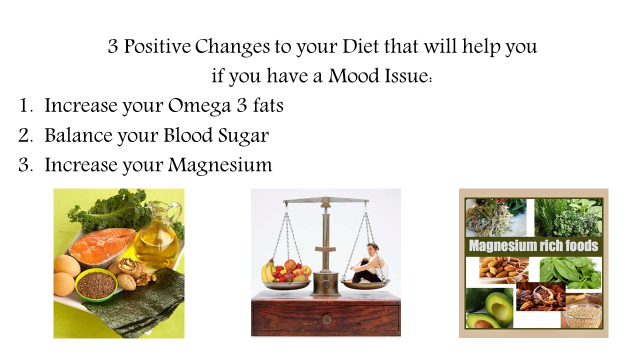
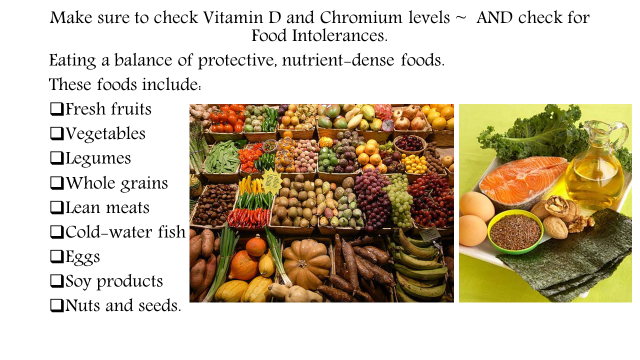

Consuming high doses (between 1 and 4 grams) of TBHQ (tert-Butylhydroquinone or tertiary butylhydroquinone) can cause nausea, delirium, collapse, tinnitus (ringing in the ears), and vomiting. There are also suggestions that it may lead to restlessness, and hyperactivity in children as well as asthma, rhinitis and dermatitis. It is used industrially as a corrosion inhibitor in biodiesel. In perfumery, it is used as a fixative to lower the evaporation rate and improve stability. It is also added to varnishes, lacquer, resins, and oil field additives. In foods, it is used as a preservative for unsaturated vegetable oils and many edible animal fats. It does not cause discoloration, and does not change flavor or odor of the material to which it is added. As a food additive, its E Number is E319. It is added to a wide range of foods, with the highest limit (1 gram/kg) permitted for many products. Its primary advantage is enhancing storage life.
Many doctors suggest a high protein diet:
- Fruits
- Vegetables
- Whole grains
- Lean protein foods
- Healthy fats (Omega-3 fats – fatty fish such as salmon and tuna, flaxseeds, walnuts, soybeans, soy oil and pumpkin seeds)
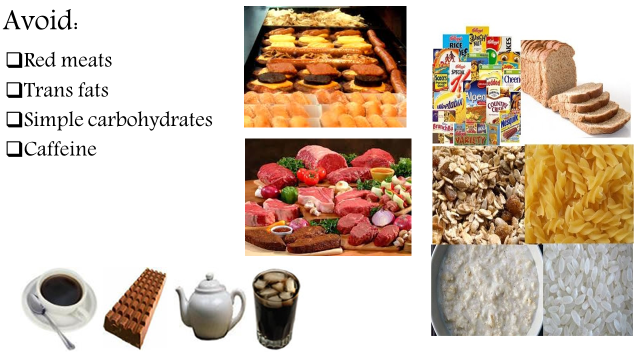
Exercise
Aerobic exercise has a neurochemical basis.
Exercise: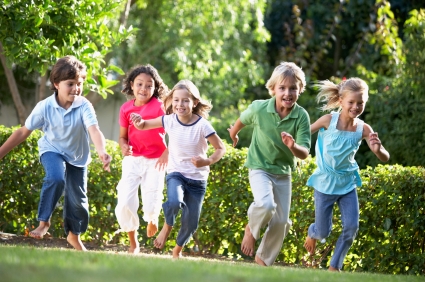
- Reduces levels of the body’s stress hormones, such as adrenaline and cortisol
- Reduces immune system chemicals that can worsen depression
- Stimulates the production of neurotransmitters, endorphins and endocannabinoids (aka feel good chemicals), the body’s natural painkillers and mood elevators.
- Increases body temperature which can have a calming effect.
Psychological and Emotional Benefits of Exercise:
Gain confidence.
Meeting exercise goals or challenges, even small ones, can boost your self-confidence. Getting in shape can also make you feel better about your appearance. As your waistline shrinks and your strength and stamina increase, your self-image will improve. You’ll earn a sense of pride and self-confidence. Your renewed vigor will help you succeed in many tasks, and the discipline will help you achieve other lifestyle goals.
Get more social interaction.
Exercise and physical activity may give you the chance to meet or socialize with others. Just exchanging a friendly smile or greeting as you walk around your neighborhood can help your mood. Exercise and sports also provide opportunities to enjoy some solitude or to make friends and build networks.
Take your mind off worries.
Exercise is a distraction that can get you away from the cycle of negative thoughts that feed anxiety and depression.
Cope in a healthy way.
Doing something positive to manage anxiety or depression is a healthy coping strategy. Trying to feel better by drinking alcohol, dwelling on how badly you feel, or hoping anxiety or depression will go away on its own can lead to worsening symptoms.
Essential Oils
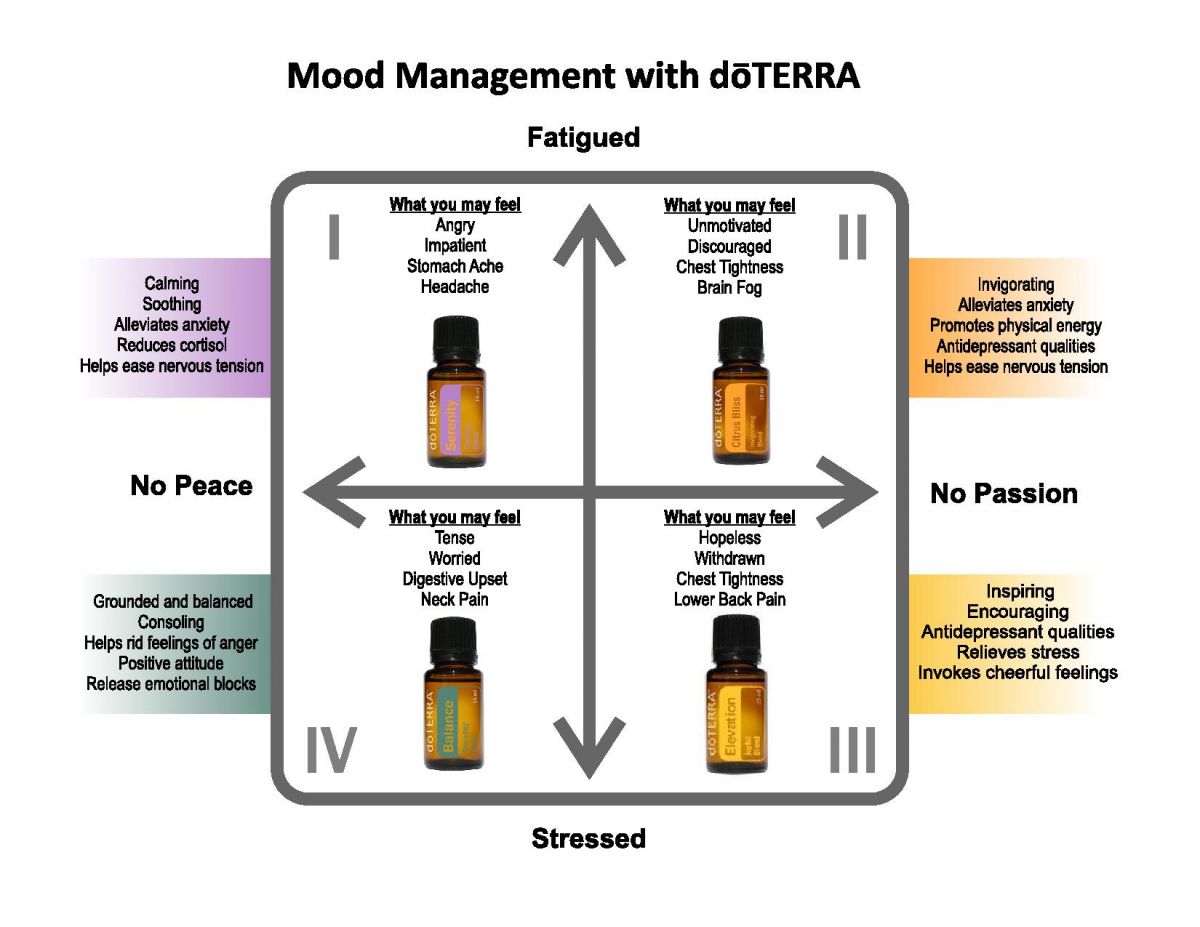
Certain brands of essential oils can be used:
- Topically
- Internally
- Aromatically
It is suggested to take them internally to support digestion, metabolism and mood. Apply them to the bottom of your child’s feet in the morning and at night or diffuse them to assist throughout the day. Essential oils also help to reduce the toxic load that kids are exposed to every day.
Contact me if you’d like to learn more about this.
Rest
 Sleep plays a vital role in good health and well-being throughout your life. Getting enough quality sleep at the right times can help protect your mental health, physical health, quality of life, and safety. The way you feel while you’re awake depends in part on what happens while you’re sleeping. During sleep, your body is working to support healthy brain function and maintain your physical health. In children and teens, sleep also helps support growth and development. Sleep helps your brain work properly. While you’re sleeping, your brain is preparing for the next day. It’s forming new pathways to help you learn and remember information. Studies show that a good night’s sleep improves learning. Whether you’re learning math, how to play the piano, how to perfect your golf swing, or how to drive a car, sleep helps enhance your learning and problem-solving skills. Sleep also helps you pay attention, make decisions, and be creative. Studies also show that sleep deficiency alters activity in some parts of the brain. If you’re sleep deficient, you may have trouble making decisions, solving problems, controlling your emotions and behavior, and coping with change. Sleep deficiency also has been linked to depression, suicide, and risk-taking behavior. Children and teens who are sleep deficient may have problems getting along with others. They may feel angry and impulsive, have mood swings, feel sad or depressed, or lack motivation. They also may have problems paying attention, and they may get lower grades and feel stressed.
Sleep plays a vital role in good health and well-being throughout your life. Getting enough quality sleep at the right times can help protect your mental health, physical health, quality of life, and safety. The way you feel while you’re awake depends in part on what happens while you’re sleeping. During sleep, your body is working to support healthy brain function and maintain your physical health. In children and teens, sleep also helps support growth and development. Sleep helps your brain work properly. While you’re sleeping, your brain is preparing for the next day. It’s forming new pathways to help you learn and remember information. Studies show that a good night’s sleep improves learning. Whether you’re learning math, how to play the piano, how to perfect your golf swing, or how to drive a car, sleep helps enhance your learning and problem-solving skills. Sleep also helps you pay attention, make decisions, and be creative. Studies also show that sleep deficiency alters activity in some parts of the brain. If you’re sleep deficient, you may have trouble making decisions, solving problems, controlling your emotions and behavior, and coping with change. Sleep deficiency also has been linked to depression, suicide, and risk-taking behavior. Children and teens who are sleep deficient may have problems getting along with others. They may feel angry and impulsive, have mood swings, feel sad or depressed, or lack motivation. They also may have problems paying attention, and they may get lower grades and feel stressed.
Support
 Friendships are important in helping children develop emotionally and socially. They provide a training ground for trying out different ways of relating to others. Through interacting with friends, children learn the give and take of social behavior in general. They learn how to set up rules, how to weigh alternatives and make decisions when faced with dilemmas. They experience fear, anger, aggression and rejection. They learn how to win, how to lose, what’s appropriate, what’s not. They learn about social standing and power – who’s in, who’s out, how to lead and how to follow, what’s fair and what’s not. They learn that different people and different situations call for different behaviors and they come to understand the viewpoints of other people. Friends provide companionship and stimulation for each other, and they find out who they are by comparing themselves to other children – who’s bigger, faster, who can add better, who can catch better. They learn that they’re both similar to and different from others. Through friendships and belonging to a group children improve their sense of self-esteem. The solace and support of friends help children cope with troubling times and through transition times – moving up to a new school, entering adolescence, dealing with family stresses, facing disappointments.
Friendships are important in helping children develop emotionally and socially. They provide a training ground for trying out different ways of relating to others. Through interacting with friends, children learn the give and take of social behavior in general. They learn how to set up rules, how to weigh alternatives and make decisions when faced with dilemmas. They experience fear, anger, aggression and rejection. They learn how to win, how to lose, what’s appropriate, what’s not. They learn about social standing and power – who’s in, who’s out, how to lead and how to follow, what’s fair and what’s not. They learn that different people and different situations call for different behaviors and they come to understand the viewpoints of other people. Friends provide companionship and stimulation for each other, and they find out who they are by comparing themselves to other children – who’s bigger, faster, who can add better, who can catch better. They learn that they’re both similar to and different from others. Through friendships and belonging to a group children improve their sense of self-esteem. The solace and support of friends help children cope with troubling times and through transition times – moving up to a new school, entering adolescence, dealing with family stresses, facing disappointments.
At its most basic level, mentoring helps because it guarantees a young person that there is someone who cares about them. A child is not alone in dealing with day-to-day challenges. Mentors provide their mentees with an experienced friend who is there to help in any number of situations.
 Support for education
Support for education
- Mentors help keep students in school.
- Students who meet regularly with their mentors are 52% less likely than their peers to skip a day of school and 37% less likely to skip a class (Public/Private Ventures study of Big Brothers Big Sisters).
- Mentors help with homework and can improve their mentees’ academic skills.
Support with day-to-day living
- Mentors help improve a young person’s self-esteem.
- Youth who meet regularly with their mentors are 46% less likely than their peers to start using illegal drugs and 27% less likely to start drinking (Public/Private Ventures study of Big Brothers Big Sisters).
- About 40% of a teenager’s waking hours are spent without companionship or supervision. Mentors provide teens with a valuable place to spend free time.
- Mentors teach young people how to relate well to all kinds of people and help them strengthen communication skills.
 Parenting is a key role in a child’s development. Many of the skills children acquire are fundamentally dependent on their interactions with their caregivers and the broader social environment. In fact, the quality of parenting a child receives is considered the strongest potentially modifiable risk factor that contributes to the development of behavioral and emotional problems in children. Parent-child interactions affect many different areas of development, including self-esteem, academic achievement, cognitive development and behavior. In a number of investigations, sensitive-responsive parenting was linked to positive emotionality in children, while children who were negative, irritable or aggressive were found to have received less supportive, if not problematic parenting. More specifically, inconsistent, rigid or irritable explosive discipline, as well as low supervision and involvement, have been closely associated with the development of child conduct problems. Parental responsiveness is also important for cognitive development. Studies have shown that cognitively-responsive behaviours, such as maintaining vs redirecting interests and rich verbal inputs, provide the child structure in developing his attention and language skills. Moreover, the early and consistent participation in learning activities, as well as the provision of age-appropriate learning materials foster language development and learning in general. Not only do those parental practices set an optimal learning environment for the child, they encourage him to assume an active role in the learning process and to develop a positive attitude toward learning.
Parenting is a key role in a child’s development. Many of the skills children acquire are fundamentally dependent on their interactions with their caregivers and the broader social environment. In fact, the quality of parenting a child receives is considered the strongest potentially modifiable risk factor that contributes to the development of behavioral and emotional problems in children. Parent-child interactions affect many different areas of development, including self-esteem, academic achievement, cognitive development and behavior. In a number of investigations, sensitive-responsive parenting was linked to positive emotionality in children, while children who were negative, irritable or aggressive were found to have received less supportive, if not problematic parenting. More specifically, inconsistent, rigid or irritable explosive discipline, as well as low supervision and involvement, have been closely associated with the development of child conduct problems. Parental responsiveness is also important for cognitive development. Studies have shown that cognitively-responsive behaviours, such as maintaining vs redirecting interests and rich verbal inputs, provide the child structure in developing his attention and language skills. Moreover, the early and consistent participation in learning activities, as well as the provision of age-appropriate learning materials foster language development and learning in general. Not only do those parental practices set an optimal learning environment for the child, they encourage him to assume an active role in the learning process and to develop a positive attitude toward learning.
http://www.childhooddepression.us/articles6.html
http://www.cnn.com/2011/09/21/health/living-well/preschoolers-on-meds/
http://www.health.harvard.edu/blog/astounding-increase-in-antidepressant-use-by-americans-201110203624
http://www.fightforkids.org/facts.php
http://www.health.harvard.edu/blog/7-common-causes-of-forgetfulness-201302225923

